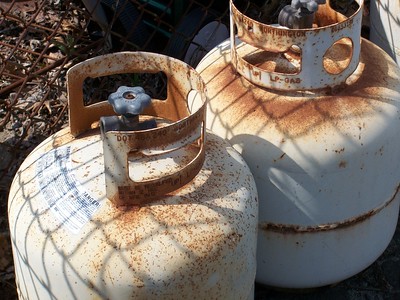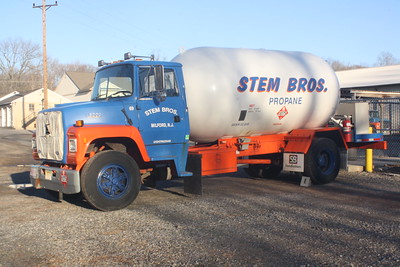
Propane, unlike many other fuels, does not go bad or degrade over time, which means in terms of its chemical composition, it does not “go bad” or spoil in the way that biological products do. Propane is a hydrocarbon, specifically a liquefied petroleum gas (LPG), and under normal conditions, it is stable and has an indefinite shelf life. However, while the gas itself remains stable, there are external factors that can affect its usability and safety.
However, for your safety and the optimal performance of your propane appliances, there are several important aspects you should keep in mind.
- Propane’s Longevity: Propane is a stable molecule consisting of three carbon atoms and eight hydrogen atoms. It’s non-toxic and not susceptible to spoilage. You can rest assured that the propane itself will remain the same as long as it’s properly contained.
- Storing Your Propane: The way you store your propane is pivotal. Ensure that you keep propane tanks in a well-ventilated space, shield them from extreme temperatures, and avoid direct sunlight. While the propane gas will remain stable, the tanks can suffer from exposure and degrade over time, leading to leaks or other safety hazards.
- Tank Integrity Is Key: Check your propane tank’s expiration date—it’s typically safe to use for 12 years from its manufacture date in the U.S. After that, it’s time to get it recertified or replaced to ensure it’s still safe to hold the gas.
- Watch for Contamination: Although propane is robust, contamination is still a risk. If water or air sneaks into your tank, it could rust from the inside or form ice that affects performance. This doesn’t mean your propane is bad, but it may compromise the effectiveness of the fuel delivery and appliance operation.
- Safety Above All: Propane tanks have safety valves designed to vent propane if internal pressure gets too high (like on a scorching summer day). It’s a feature that prevents accidents, not a sign that your propane has gone bad, but it can decrease the amount of fuel available.
- Performance Matters: If your appliances start acting up, it may not be the propane at fault but potentially a leaky tank or a malfunctioning gas regulator. These are equipment issues that you should address promptly for efficiency and safety.
In essence, while propane doesn’t expire or “go bad,” the tank it’s stored in might. Keep an eye on storage conditions, the integrity of your tank, and any signs of equipment malfunction. Regular checks and maintenance are your best defense to ensure that your propane serves you safely and efficiently. If something seems amiss, don’t hesitate to call in a professional to take a look. After all, it’s not just about keeping the propane ready to use; it’s about keeping you safe.
Shelf Life of Propane
When it comes to the fuels you use, shelf life is an essential consideration—it’s about how long they’ll stay good for use. Here’s what that means for your propane:
A. What Does Shelf Life Mean for Fuels Like Propane?
- In Simple Terms: Think of shelf life as the “best before” period for your fuel, after which its quality and effectiveness might not be what you expect.
- Why It Matters: Knowing this helps you plan. For instance, if you’re storing fuel for emergencies, you need to know it’ll work when you need it most.
B. What Could Affect the Shelf Life of Your Propane?
- The Conditions: Where and how you store your propane can affect the container it’s in, even if it doesn’t touch the propane itself.
- The Container’s Health: Propane lives in steel or aluminum tanks that can rust or corrode over time if not looked after.
- Keeping a Tight Seal: The valves and seals on your tank must be in top shape to keep the propane where it should be—inside the tank.
- Avoiding Rusty Surprises: Keep water out to prevent internal rust, which could lead to bigger problems than just an underperforming grill.
C. The Shelf Life of Propane: Theory vs. Reality
- In a Perfect World: Propane could last forever in an ideal world with a perfect seal. It doesn’t go off on its own.
- In Your Backyard: The true test comes down to the tank. In the U.S., propane tanks come with an expiration date—usually 12 years. When the date’s up, it’s time for a check-up to keep things safe and legal.
In essence, your propane is more timeless than your favorite pair of jeans. As long as you keep the tank in check—free from rust, corrosion, and with a good seal—your propane will be ready to fire up the grill or heat your house whenever you need it. Stay on top of your tank’s condition, and you’ll ensure your propane’s shelf life is as long-lasting as it’s meant to be. Safety first, barbecue second!
How to Ensure Your Propane Lasts
A. The Best Way to Store Your Propane
- Cool and Ventilated: You’ll want to keep your propane tanks in a spot that’s cool and has good airflow.
- Avoid the Sun: Sunlight can be a propane tank’s enemy, so stick to the shade to avoid unnecessary pressure build-up.
- Upright Position: Always store your tanks standing up to keep the pressure regular and the valves in good condition.
- Stay Dry: A dry storage spot helps prevent rust and extends the life of your tank.
B. Watch Out for These Propane Storage Pitfalls
- Leaks: A worn-out valve or seal could let propane escape. Make checking these a regular part of your routine.
- Rust Happens: But you don’t want it on your propane tank. Keep an eye out for any signs of corrosion which can lead to bigger problems.
- Contaminants: Water’s the main worry here. It doesn’t mix well with propane and can cause rust or freezing issues.
C. Safety Should Always Come First
- Keep Your Distance: Store propane away from anything flammable or any sources of heat or sparks.
- Regular Checks: Look over your tanks periodically for any wear and tear or signs of damage.
- Follow the Rules: Make sure you’re up to date on local propane storage regulations to stay safe and legal.
How to Tell if Your Propane is Up to Snuff
A. Spotting a Bad Tank
- Smell Something Off? Propane has a strong, distinctive scent added to it for safety—if you catch a whiff without a flame, there might be a leak.
- Look it Over: Dents, rust, or discoloration on your tank are visual clues that something’s not right.
- Listen Up: A hissing sound could mean gas is escaping from somewhere it shouldn’t be.
B. Use Your Senses to Stay Safe
- Trust Your Nose: If you smell that rotten egg odor and you’re not using your propane, it’s time to investigate.
- Visually Inspect: Any signs of damage to the tank can be a precursor to problems.
- Check the Performance: Are your propane-powered devices not working like they used to? The issue might be with the propane supply.
C. If You Think Your Propane is Compromised…
- Don’t Take Chances: If you suspect a leak, shut off the tank if you can do so safely, and call in the pros.
- Get to Safety: A strong gas smell or the sound of leaking gas means it’s time to leave the area and call emergency services from afar.
- Stay Alert: Consider installing propane and carbon monoxide detectors for an extra layer of safety.
By keeping these tips in mind, you’ll help ensure that your propane lasts as long as possible and remains safe to use. Regularly caring for your propane tanks and being vigilant about potential issues can prevent many common problems. Always prioritize safety, and if in doubt, seek assistance from experts.
Keeping Your Propane in Top Condition
Maintaining the quality of your propane isn’t just about ensuring a good barbecue—it’s about safety and efficiency. Here’s how to keep your propane in prime condition:
A. Regular Maintenance: The Key to Propane Purity
- Regular Inspections: Make it a habit to check your propane tanks for any signs of wear, damage, or corrosion.
- Seal and Valve Checks: Ensure the tank’s seal and valve are intact and functioning correctly to prevent leaks.
- Cleanliness is Crucial: Keep the tank surface clean from dirt, grime, and grease, which can cause corrosion over time.
B. Proper Handling and Usage: Avoiding Contamination
- Use with Care: Always handle your propane tank with care to avoid dents and damage that can affect its integrity.
- Follow Directions: Use your propane according to the manufacturer’s guidelines—this helps prevent issues related to overuse or misuse.
- Quality Control: Only refill your propane tanks at reputable stations to avoid the risk of contamination from impurities.
C. Tips for Long-Term Storage of Propane Tanks
- Steady Storage: Choose a stable, flat surface where the tank can sit securely and won’t be at risk of falling over.
- Protect from the Elements: Store your propane tank in a well-ventilated area away from extreme temperatures and protected from the elements.
- Safety First: Keep your stored propane tanks out of reach of children and away from high-traffic areas.
Navigating Propane Tank Expiry and Recertification
A. Understanding Tank Expiry Dates
- Know Your Dates: Familiarize yourself with the manufacture or expiry date stamped on your propane tank—this is a critical safety measure.
- Count the Years: Propane tanks are typically certified for 12 years from the date of manufacture, after which they need to be recertified.
B. The Process of Tank Recertification
- Seek a Professional: When it’s time for recertification, take your tank to a certified professional who can conduct the necessary inspections and tests.
- Regular Intervals: After the initial 12-year period, your tank will need to be recertified every 5 to 10 years, depending on local regulations.
C. Disposing of Old or Unusable Propane Tanks
- Never Toss in the Trash: Propane tanks should never be thrown out with regular garbage due to the potential hazard of leftover gas.
- Recycling Options: Look for local facilities that accept old propane tanks for recycling.
- Safe Disposal: If recycling isn’t an option, inquire with local authorities or waste management services on how to dispose of the tank safely.
By following these best practices, you can ensure your propane remains high quality and ready to use whenever you need it. Regular maintenance, careful handling, and adherence to safety protocols are crucial for the longevity and performance of your propane tanks. Always stay informed about the condition of your tanks, and when in doubt, consult with professionals for guidance.
Myths and Misconceptions About Propane
A. Debunking Common Myths About Propane Shelf Life
You might have heard whispers and rumors about propane losing its edge over time. Let’s set the record straight:
- Myth: “Propane has a shelf life and can go bad like food.” This tall tale is quite popular but completely untrue. Propane, when contained properly, doesn’t spoil, degrade, or diminish in quality over time.
- Myth: “The longer you store propane, the less effective it becomes.” This is another common misunderstanding. Propane’s effectiveness is not linked to how long you store it. Its chemical composition remains stable, making it just as potent after several years as the day it was bottled.
B. Distinguishing Between Tank Deterioration and Propane Degradation
It’s vital to separate the facts about the tank from the fiction about the fuel:
- Tank Care: While the propane inside remains unchanged, the tank it’s stored in does not share this immunity to time. Tanks can rust, corrode, and deteriorate, which can lead to leaks and safety hazards.
- Propane Stability: Propane gas itself is notably resilient. It doesn’t react with the tank interior or lose its combustibility over time, so what you really need to watch is the container’s condition, not the gas inside it.
Understanding these truths ensures you keep a keen eye on what matters—the health of your propane tanks—and not on unfounded concerns about the gas within. Remember, with proper care and vigilance, your propane supply is a long-term ally, always ready at the turn of a valve.
Conclusion
Propane stands the test of time, not just as a fuel but as a symbol of energy reliability. It doesn’t degrade or lose potency, making it a stalwart of long-term storage, as long as the tanks it’s stored in are well-kept and regularly checked for safety.
Its steadfast nature as a fuel source is only matched by its versatility across various applications, from heating homes to cooking outdoors. Yet, this does not diminish the importance of vigilant safety practices and proper handling.
The takeaway is clear: with conscientious maintenance and a commitment to safety, propane will continue to be an energy ally you can count on, year after year.

Mike is an experienced propane technician with over 15 years of professional experience in the field. He has dedicated his career to helping customers with their propane needs, from installation to maintenance and repair. Together with Jeremy, he co-founded this website to provide useful information and guidance to customers seeking reliable propane services.



